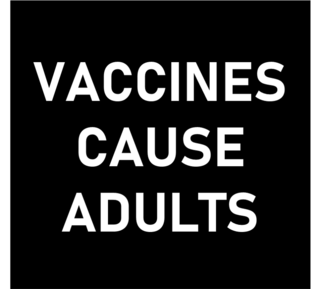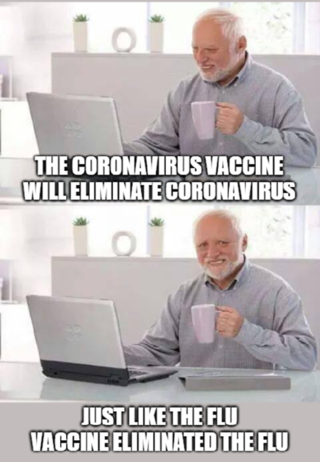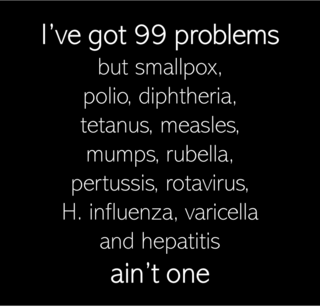Media
Does Posting Pro or Anti-Vaccine Memes on Social Media Work?
Instead of changing minds, such posts will harden opposing attitudes.
Posted December 14, 2020 Reviewed by Lybi Ma
“Sometimes our power resides not in what we do, but in what we don’t do.” – Paulo Coelho.
When browsing my social media feeds this past week, I experienced déjà vu. The feeds were flooded with Covid-19 pro- and anti-vaccine memes. (See some recreated examples below). By mocking vaccine skeptics and people hesitant about them, the pro-vaccine meme posters expressed their support for taking the Covid-19 vaccine, and vice versa. In my feeds, the memes invariably led to passionate arguments between those opposed to the Covid-19 vaccination and those favoring it. The biting humor and mockery, the simmering anger, the resentment and contempt, all led to a sense of an unbridgeable divide. It felt like the week before the Presidential election all over again.

Seeing this proliferation of vaccine memes, I had two questions. First, why are so many people posting vaccine memes? In particular, do they want to persuade others to change their minds about Covid-19 vaccination, or are there other motivations? And second, assuming persuasion is the main reason, does it work? Will those who support vaccination decide not to get the Covid-19 vaccine? And will vaccine skeptics change their attitudes after seeing pro-vaccine memes? In this post, I want to examine what psychological research says about these two questions.
Are pro- and anti-vaccine meme posters trying to influence others with opposing viewpoints?
Two decades of research shows that we post on social media for three main reasons:
- to curate and portray an idealized image of ourselves
- to display and endorse our memberships in valued groups, whether it’s our family, a political party, or our love for a sports team
- to seek attention

Influencing others and changing their minds is a fourth reason to post, but it’s a distant fourth for most of us. It applies mainly to the subset of people who wield influence on social media, either because they are well-known and have large social media followings or because they are experts within a particular domain.
There are many studies in communication psychology, consumer psychology, and political psychology that have found this persuasive mindset among social media opinion leaders. One prominent area where persuasion is the primary driver of posts is influencer marketing, where celebrities and others with large followings use their persuasive powers to sell branded products and services, support a particular politician or political viewpoint, etc.
For most social media users, however, the three primary motivations are far more relevant. Posting a pro-vaccine meme is a way to publicly express endorsement of vaccination and all the related political and social stances such support communicates. It is a way to draw attention and likes from like-minded people within one’s social media circle and burnish one’s image as pro-science. And research suggests that expressing anger against vaccine skeptics by mocking may be reason enough to share memes.
Will posting pro-vaccine memes persuade vaccine skeptics and those who are hesitant to embrace Covid-19 vaccination?
There is evidence that people pay attention to social media recommendations. When Facebook friends like or share a news story, for example, they use this endorsement as a heuristic in deciding which stories to read. Some studies show that dissenting political opinion is more likely to receive exposure by those people who have a diverse circle of social media connections. When a Facebook friend posts a pro-vaccine meme, for example, a vaccine skeptic will at least be exposed to the opposing viewpoint.

However, such exposure doesn’t have much impact in changing people’s attitudes about the issue. When a meme that is even remotely associated with a partisan issue is shared on social media by those who think differently from us, it will not have any impact on our beliefs. Just because a Democrat promotes gun control, their Republican friends will not go out and sell their guns. The opposite is far more likely to happen.
Persuasion attempts from someone with an opposing viewpoint harden and polarize the target’s existing attitudes. Numerous studies show this result. In one study conducted in Western Europe, the authors found “…that messages blaming the elites or immigrants bolstered citizens’ populist attitudes, but only for those who supported the source of the message. For those who opposed the source, in contrast, populist blame attributions reduced populist attitudes.” In another study, “Republican participants expressed substantially more conservative views after following a liberal Twitter bot, whereas Democrats’ attitudes became slightly more liberal after following a conservative Twitter bot—although this effect was not statistically significant.”
In a third study about the role of fake news in the 2016 election, the authors concluded, “people are much more likely to believe stories that favor their preferred candidate.” And in a fourth paper, the authors “found that use of pro-attitudinal partisan news online is associated with increased anger, but not anxiety, directed at the opposing party’s presidential candidate and that anger subsequently facilitated information sharing about the election on social media.” In a nutshell, posting memes on social media is unlikely to change minds about Covid-19 vaccination.
Conclusion
People are likely posting Covid-19 vaccine memes on social media to mock those who don’t share their views. They also want to take a public stand about their opinion and proclaim their membership in in-groups. The upshot is that this effort is unlikely to persuade anyone who holds an opposing view and may, in fact, encourage them to take more extreme positions. With every pro- or anti-vaccine meme, the chasm between the two groups grows wider and deeper. I wonder whether it may not be prudent to follow Coelho’s sage advice in the epigraph and exercise our power by refraining from posting.




